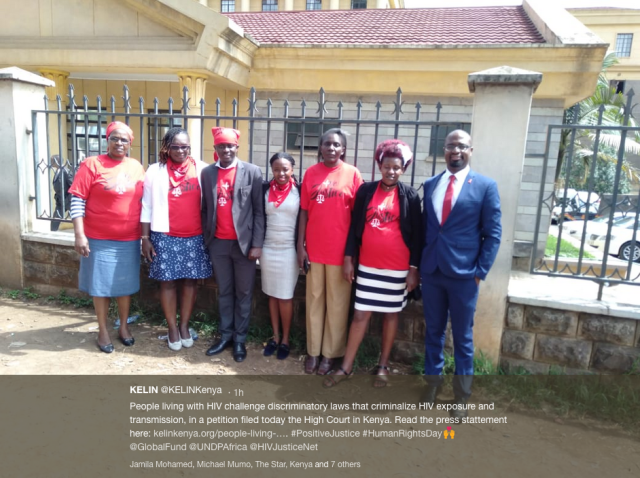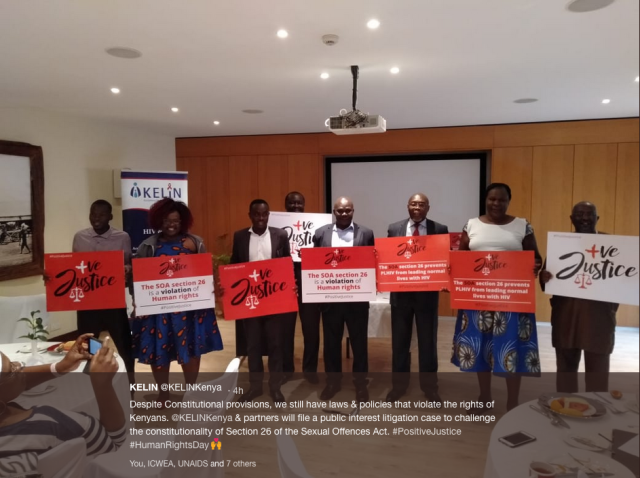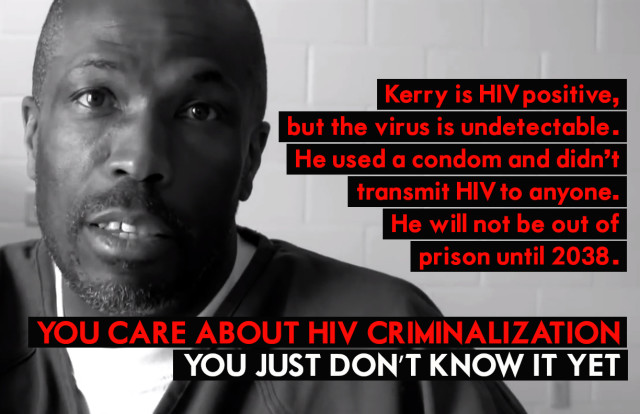January 2019 Newsletter
Table of Contents
HIV is Not a Crime III
HIV is Not a Crime III Training Academy (HINAC III), produced by Sero in partnership with the Positive Women’s Network-USA, educated and trained 245 advocates from 36 U.S. states and six countries (Canada, Mexico, Belize, Germany, UK, and Colombia).
The gathering was held June 3-6, 2018, at Indiana University-Purdue University Indianapolis (IUPUI) with in-state organization partners, the Indiana HIV Modernization Movement, and Brothers United.
HINAC III included a two-day Black United Leadership Institute (BULI) pre-conference for 50 participants, to elevate leadership of Black people, especially PLHIV, in state-level efforts to address HIV criminalization. The full report from the 2018 HINAC Training Academy can be read here.
The inaugural HIV is Not a Crime (HINAC I) event was held at Grinnell College, in Grinnell, Iowa, in June 2014. HINAC II was held in May 2016 at the University of Alabama/Huntsville, with 297 participants from 34 U.S. states, Puerto Rico, and four countries (Mexico, Canada, England, and Germany).
Planning is now underway for HINAC IV, date and location to be announced soon.
Sero video from HINAC III for Day With(out) Art 2018: Alternate Endings, Activist Risings
Sero supporter Mark S. King worked with Visual AIDS to create a video at HINAC III as part of Visual AIDS Day With(out) Art 2018: Alternate Endings, Activist Risings. Thank you to Mark and Visual AIDS, as well as Stacy Jennings, Billy Willis III, Susan Mull, Shyronn Jones, and Contonnia Turner, all featured in the video.
Network Empowerment Project: Tools to Strengthen a Movement
Sero’s Network Empowerment Project was inspired by the Denver Principles and other PLHIV self-empowerment initiatives and launched to facilitate the creation and strengthening of PLHIV networks, whether they are focused on advocacy, education, recreation, provision of services, or social support.
PLHIV networks improve health outcomes for people living with HIV as well as contribute to stigma reduction and improve advocacy outcomes. PLHIV Networks enable us to:
- Determine our own agenda(s), rather than having them defined by others;
- Choose our own priorities and strategies;
- Select and hold accountable leadership of our own choosing;
- Speak with a collective voice.
When we create community and work together, our voices are heard more clearly, and we have a greater influence on the policymaking that so profoundly affects our lives. PLHIV networks also have traditionally been the incubators from which emerges new PLHIV leadership.
NEP’s online tool kit provides resources, research, and contacts to help create and strengthen PLHIV networks.
Sing Your Song: PLHIV Networks Change Lives
On December 1, 2018, World AIDS Day, Sero released a new video about PLHIV networks, filmed at the Mississippi Positive Network‘s “We, the Positive” summit in Jackson, Mississippi in October 2018. It is a moving illustration of the power of networks to change lives and strengthen the voice of PLHIV.
State Updates
Texas: A Network is Born
In May 2017, history was made when Texans living with HIV, from Houston, Dallas, San Antonio, Beaumont, and elsewhere, created the Texans Living With HIV Network. Venita Ray, a woman living with HIV who helped organize the meeting, said, “TLHIV will be a collective voice for all Texans, ensuring that we are involved with all policies and decisions that impact our quality of life.”
“TLHIV will continue the legacy of involvement by people living with HIV embodied in the Denver Principles,” says Ray, who also serves as deputy director of Positive Women’s Network-USA. “Nothing about us without us!”
Sero staffers Tami Haught and Robert Suttle, along with facilitator Laura McTighe, were on hand at the gathering, which was supported by Sero and the Southern AIDS Coalition.
Michigan Passes HIV Criminalization Reform
Excerpt from Michigan Makes Strides in HIV Disclosure Law press release], published by Michigan Coalition for HIV Health and Safety:
January 8, 2019 – LANSING, MI. After five years of work by the Michigan Coalition for HIV Health and Safety with the Michigan Department of Health and Human Services (MDHHS), advocates living with HIV and other national and local partners, Michigan’s HIV disclosure law has been modernized.
The new legislation, HB 6020 and HB 6021, was introduced by State House Representative Jon Hoadley (D-Kalamazoo) and was supported by the Republican majorities in the House and Senate. After passing both chambers, the bill was presented to Governor Snyder who signed the bill December 27, 2018.
Previously, a person living with HIV (PLHIV) could face a felony up to 4 years in prison for not disclosing their HIV status prior to any type of sexual penetration. The degree of risk of HIV transmission was not a factor in the statute; including circumstances where there was no HIV transmission, nor even any risk of HIV transmission.
The amended law removes those living with HIV who are on treatment and virally suppressed—posing no risk of transmitting HIV—from being subject to prosecution. It also narrows the scope of sexual activities subject to prosecution, from “any type of sexual penetration to only “vaginal and anal sex.” Oral sex, which poses no or negligible risk of transmission regardless of whether the person with HIV is on treatment or virally suppressed, is no longer subject to prosecution.
View the full press release here.
Virginia is for (Justice) Lovers
In November, Ending HIV Criminalization and Over Incarceration in Virginia Coalition (ECHO VA) and Sero hosted a strategic planning meeting for service providers, grassroots activists, public health professionals, legal experts, and PLHIV to engage across differences; strengthen connections to broader struggles for racial, gender, economic, and health justice; and to develop shared values and priorities in the movement to end HIV criminalization in Virginia.
Georgia: HIV Rural Research and Training Conference
Sero hosted a workshop on HIV criminalization at the HIV Rural Research and Training Conference in Savannah, Georgia in September 2018. The workshop focused on strategies and tools to advance HIV criminalization reform efforts and, specifically, to update attendees on legislative reform efforts underway in Georgia and Florida.
Jack White III, co-director of THRIVE SS‘s Political and Social Action Network, presented current efforts of the Georgia HIV Justice Coalition. Sero’s Kamaria Laffrey discussed successes and challenges the Florida HIV Justice Coalition has experienced.
Sero’s Tami Haught and Cindy Stine led a discussion on building a diverse coalition of PLHIV; medical, public health, and legal professionals; and AIDS service, healthcare, and faith-based organizations to mobilize for change.
To get involved with the Georgia HIV Justice Coalition, contact Johnnie Ray Kornegay III at johnnie.kornegay@counternarrative.org. For information about theFlorida HIV Justice Coalition, contact Kamaria Laffrey at kamaria.laffrey@seroproject.com.
Florida: Learning from the Legislative Process
Efforts in the Florida legislature to modernize HIV-related statutes made progress in 2017 and 2018. After a day-long stakeholders planning session in October, 2018, the Florida HIV Justice Coalition is now organizing for the 2019 legislative session.
Sero’s Kamaria Laffrey coordinates the Florida HIV Justice Coalition and works closely with its steering committee to expand their coalition of advocates and allies to share a clear, unified message with the community, media, and legislators on the detrimental effects of HIV criminalization.
The Steering Committee includes representatives from ACLU-FL, Lambda Legal, AHF, Sero Project, PWN, Southern Poverty Law Center, SAVE, Equality FL, The AIDS Institute, and Sex Workers Outreach Project. Kamaria also works on a regional training program to groom leaders, particularly women living with HIV, to educate and mobilize on HIV criminalization issues across Florida.
Pennsylvania: PLHIV Organizing in the Keystone State
Sero, Positive Women’s Network-Philadelphia, and the AIDS Law Project of Pennsylvania are working together to raise awareness of HIV-related stigma, discrimination, and criminalization in Pennsylvania.
Last May, Sero’s Sean Strub participated on a panel discussion at the LGBT Center of Central Pennsylvania with Julie Graham, a criminalization survivor, Alder Health Service’s Rosemary Brown, and Ronda Goldfein, Esq., executive director of the PA AIDS Law Project. Strub and Goldfein participated on a similar panel held in the Lehigh Valley at Northampton Community College.
In September, a delegation including Waheedah Shabazz-El (PWN-USA), Teresa Sullivan (PWN-Philadelphia), Andrea Johnson (PWN-Philadelphia), Adrian Shanker and Atticus Ranck (Bradbury-Sullivan LGBT Center in Allentown), Adrian Lowe (PA AIDS Law Project), as well as Strub and Goldfein, met with Pennsylvania Surgeon General Rachel Levine and her staff to review a range of HIV-related issues.
A statewide strategic planning session is scheduled for February 2019 to coordinate plans for launching a new Pennsylvania PLHIV HIV Justice Network.
If you are interested in joining the movement to create a statewide network in PA, contact: info@seroproject.com.
Idaho Moving Forward
The Idaho Coalition for HIV Health and Safety hosted a 2-day strategic planning meeting September 25-26, 2018. The meeting focused on drafting a modernization bill, messaging and advocacy organizing strategy.
North Carolina HIV Advocacy Conference
Sero’s Tami Haught joined Carolyn McAllaster (Duke HIV/AIDS Law Clinic), Jacquelyn Clymore (NC HIV/STD/Viral Hepatitis Director), Alicia Diggs (Positive Wellness Alliance), and Jeffery Edwards-Knight (Mecklenburg County Public Health) at the 2018 NC HIV Advocacy Conference: Building Power Across the Spectrum.
The opening plenary, “HIV Criminalization in North Carolina: Where We’ve Been and Where We’re Going,” presented changes in North Carolina’s HIV control measures, reviewed task force processes, and discussed the interaction between state and county health officials and where North Carolina fits within national efforts to end HIV criminalization.
North Carolina AIDS Action Network debuted this short video.
International AIDS Conference
At the 22nd International AIDS Conference, held in Amsterdam in July 2018, Sero helped make awareness of and action addressing HIV criminalization a priority:
Sero co-sponsored a pre-conference, Beyond Blame 2018: Challenging HIV Criminalization.
Sero’s Robert Suttle spoke on a panel at the conference’s opening plenary (Robert’s comments begin at 1:38:00). Right after Robert’s eloquent comments, Sir Elton John and Prince Harry came on stage for their presentation!
An Expert Consensus Statement on the Science of HIV in the Context of the Criminal Law was released at a press conference with representatives from the International AIDS Society, International Association of Providers of AIDS Care, UNAIDS, Sero, and HIV Justice Worldwide. The statement, now endorsed by more than 70 of the most respected HIV scientists, physicians, and researchers in the world, was also published in the Journal of the International AIDS Society.
Professor Linda-Gail Bekker, the President of the International AIDS Socity, listens intently as Kerry Thomas, a member of Sero’s board of directors, spoke at the press conference by telephone from the prison in Idaho where he is incarcerated and serving a 30-year sentence for HIV non-disclosure, despite using condoms and having had an undetectable viral load.
Sero’s Kamaria Laffrey (left) spoke at the march that opened the conference, joined by Laela Wilding and Quinn Tivey, icon AIDS activist Elizabeth Taylor’s granddaughter and great-grandson, who are continuing Dame Elizabeth’s legacy through their work with the Elizabeth Taylor AIDS Foundation.
S.O.S.
Dear Sero Project supporters and allies,
Working to end HIV-related stigma, discrimination, and criminalization can be frustrating or disheartening, especially for those who suffer the most extreme consequences of such injustice. That’s partly because HIV stigma bias is, unfortunately, rising rather than declining. Even as we make progress in our efforts to end HIV criminalization—and we have made progress this year—the road ahead stretches long into the future.
Decades ago, I first viewed my AIDS activism as a temporary priority, something that could be fixed and then I could move on with other endeavors and priorities in my life. My perspective changed over time, as it did for others, because we learned, or experienced, how inextricably HIV-related injustices are linked to other injustices. Even as effective therapy changed what it meant to live with HIV, it only brought those other injustices into starker relief.
Eventually, I stopped looking for where the road ended, for some mythical point in the future when all will be well, and came to understood that activism was a defining value in my life, fundamental to my purpose. A similar commitment is reflected in Sero’s staff—Robert Suttle, Tami Haught, Ken Pinkela, Kamaria Laffrey, Cindy Stine, and Gonzalo Aburto—and it is shared by so many partners, allies, and comrades in the broader community of those fighting to end HIV criminalization. I salute all of them and I salute you.
Let’s hope 2019 brings a renewed respect for people living with HIV and many more allies in our struggle for justice for all.
Regards,
Sean Strub
Executive Director
Sero at Harvard Law School
Last March, Sero’s Executive Director, Sean Strub, participated on a panel, Creating a Viral Underclass, at an event at Harvard Law School organized by Harvard Law School Lambda, the Petrie-Flom Center for Health Law Policy, Biotechnology, and Bioethics, and the Center for Health Law and Policy Innovation.
Sero Holiday Card Project
Every year, Sero’s Cindy Stine coordinates a Holiday Card project to send cards to incarcerated people, mostly people living with HIV or other chronic health conditions. Volunteers all over the U.S. prepare cards according to the restrictions imposed by prison officials (no glitter, colored paper, etc.) Cindy collects the cards and sends them to the recipients to let them know there is a community that cares about them and is thinking of them, especially over the holidays.
Media Watch: Sero in the News
Many thanks to Allison Nichol, Sero’s Senior Legal and Policy Advisor, for her dedication and commitment to the rights of people living with HIV. Allison has taken a new full-time position as Director of Legal Advocacy for the Epilepsy Foundation of America. We are grateful that she will continue to work with Sero on several projects in a pro bono capacity, and we wish her the best of luck in this new role.
Thank You
Sero’s work is made possible by contributions from many donors, including major support from the Elton John AIDS Foundation, H. van Ameringen Foundation, Broadway Cares/Equity Fights AIDS, Ittleson Foundation, ViiV, AIDS Healthcare Foundation, and the Levi Strauss Foundation. Please support Sero’s work by donating online.




